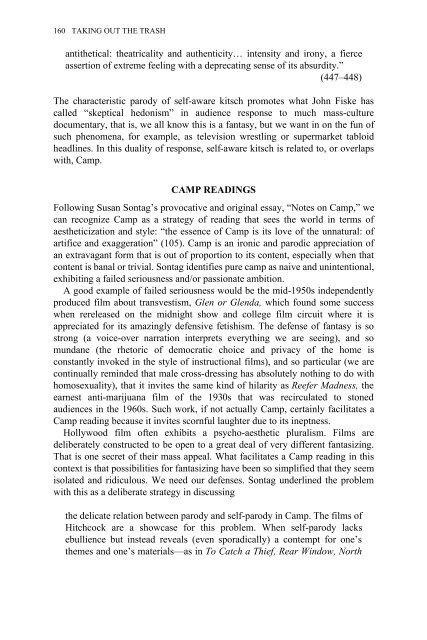Edited by Moe Meyer - Get a Free Blog
Edited by Moe Meyer - Get a Free Blog
Edited by Moe Meyer - Get a Free Blog
You also want an ePaper? Increase the reach of your titles
YUMPU automatically turns print PDFs into web optimized ePapers that Google loves.
160 TAKING OUT THE TRASH<br />
antithetical: theatricality and authenticity… intensity and irony, a fierce<br />
assertion of extreme feeling with a deprecating sense of its absurdity.”<br />
(447–448)<br />
The characteristic parody of self-aware kitsch promotes what John Fiske has<br />
called “skeptical hedonism” in audience response to much mass-culture<br />
documentary, that is, we all know this is a fantasy, but we want in on the fun of<br />
such phenomena, for example, as television wrestling or supermarket tabloid<br />
headlines. In this duality of response, self-aware kitsch is related to, or overlaps<br />
with, Camp.<br />
CAMP READINGS<br />
Following Susan Sontag’s provocative and original essay, “Notes on Camp,” we<br />
can recognize Camp as a strategy of reading that sees the world in terms of<br />
aestheticization and style: “the essence of Camp is its love of the unnatural: of<br />
artifice and exaggeration” (105). Camp is an ironic and parodic appreciation of<br />
an extravagant form that is out of proportion to its content, especially when that<br />
content is banal or trivial. Sontag identifies pure camp as naive and unintentional,<br />
exhibiting a failed seriousness and/or passionate ambition.<br />
A good example of failed seriousness would be the mid-1950s independently<br />
produced film about transvestism, Glen or Glenda, which found some success<br />
when rereleased on the midnight show and college film circuit where it is<br />
appreciated for its amazingly defensive fetishism. The defense of fantasy is so<br />
strong (a voice-over narration interprets everything we are seeing), and so<br />
mundane (the rhetoric of democratic choice and privacy of the home is<br />
constantly invoked in the style of instructional films), and so particular (we are<br />
continually reminded that male cross-dressing has absolutely nothing to do with<br />
homosexuality), that it invites the same kind of hilarity as Reefer Madness, the<br />
earnest anti-marijuana film of the 1930s that was recirculated to stoned<br />
audiences in the 1960s. Such work, if not actually Camp, certainly facilitates a<br />
Camp reading because it invites scornful laughter due to its ineptness.<br />
Hollywood film often exhibits a psycho-aesthetic pluralism. Films are<br />
deliberately constructed to be open to a great deal of very different fantasizing.<br />
That is one secret of their mass appeal. What facilitates a Camp reading in this<br />
context is that possibilities for fantasizing have been so simplified that they seem<br />
isolated and ridiculous. We need our defenses. Sontag underlined the problem<br />
with this as a deliberate strategy in discussing<br />
the delicate relation between parody and self-parody in Camp. The films of<br />
Hitchcock are a showcase for this problem. When self-parody lacks<br />
ebullience but instead reveals (even sporadically) a contempt for one’s<br />
themes and one’s materials—as in To Catch a Thief, Rear Window, North


